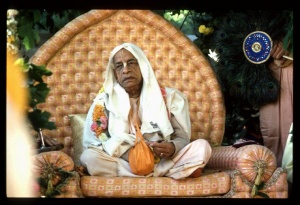SB 6.14.20: Difference between revisions
m (1 revision(s)) |
m (Text replacement - "==== <div class=" to "==== <div class=") |
||
| Line 1: | Line 1: | ||
{{info | {{info | ||
|speaker= | |speaker=Aṅgirā Muni | ||
|listener=King Citraketu | |listener=King Citraketu | ||
}} | }} | ||
[[Category:Srimad-Bhagavatam - Canto 06 Chapter 14]] | |||
[[Category:Bhagavatam Verses Spoken by Angira Muni - Vanisource|061420]] | |||
<div style="float:left">'''[[Srimad-Bhagavatam]] - [[SB 6|Sixth Canto]] - [[SB 6.14: King Citraketu's Lamentation|Chapter 14: King Citraketu's Lamentation]]'''</div> | |||
<div style="float:right">[[File:Go-previous.png|link=SB 6.14.19]] '''[[SB 6.14.19]] - [[SB 6.14.21]]''' [[File:Go-next.png|link=SB 6.14.21]]</div> | |||
{{RandomImage}} | |||
==== TEXT 20 ==== | ==== TEXT 20 ==== | ||
<div class="verse"> | |||
<div | :yasyātmānuvaśaś cet syāt | ||
yasyātmānuvaśaś cet syāt | :sarve tad-vaśagā ime | ||
sarve tad-vaśagā ime | :lokāḥ sapālā yacchanti | ||
lokāḥ sapālā yacchanti | :sarve balim atandritāḥ | ||
sarve balim atandritāḥ | |||
</div> | </div> | ||
| Line 17: | Line 22: | ||
==== SYNONYMS ==== | ==== SYNONYMS ==== | ||
<div class="synonyms"> | |||
<div | ''yasya''—of whom; ''ātmā''—mind; ''anuvaśaḥ''—under control; ''cet''—if; ''syāt''—may be; ''sarve''—all; ''tat-vaśa-gāḥ''—under the control of him; ''ime''—these; ''lokāḥ''—the worlds; ''sa-pālāḥ''—with their governors; ''yacchanti''—offer; ''sarve''—all; ''balim''—contribution; ''atandritāḥ''—becoming free from laziness. | ||
</div> | </div> | ||
| Line 25: | Line 29: | ||
==== TRANSLATION ==== | ==== TRANSLATION ==== | ||
<div class="translation"> | |||
<div | |||
If the king's mind is fully controlled, all his family members and governmental officers are subordinate to him. His provincial governors present taxes on time, without resistance, and what to speak of lesser servants? | If the king's mind is fully controlled, all his family members and governmental officers are subordinate to him. His provincial governors present taxes on time, without resistance, and what to speak of lesser servants? | ||
</div> | </div> | ||
| Line 33: | Line 36: | ||
==== PURPORT ==== | ==== PURPORT ==== | ||
<div class="purport"> | |||
<div | |||
Aṅgirā Ṛṣi asked the King whether his mind was also under control. This is most essential for happiness. | Aṅgirā Ṛṣi asked the King whether his mind was also under control. This is most essential for happiness. | ||
</div> | </div> | ||
__NOTOC__ | |||
<div style="float:right; clear:both;">[[File:Go-previous.png|link=SB 6.14.19]] '''[[SB 6.14.19]] - [[SB 6.14.21]]''' [[File:Go-next.png|link=SB 6.14.21]]</div> | |||
__NOTOC__ | |||
__NOEDITSECTION__ | |||
Revision as of 15:36, 14 November 2018

His Divine Grace
A.C. Bhaktivedanta Swami Prabhupada
A.C. Bhaktivedanta Swami Prabhupada
TEXT 20
- yasyātmānuvaśaś cet syāt
- sarve tad-vaśagā ime
- lokāḥ sapālā yacchanti
- sarve balim atandritāḥ
SYNONYMS
yasya—of whom; ātmā—mind; anuvaśaḥ—under control; cet—if; syāt—may be; sarve—all; tat-vaśa-gāḥ—under the control of him; ime—these; lokāḥ—the worlds; sa-pālāḥ—with their governors; yacchanti—offer; sarve—all; balim—contribution; atandritāḥ—becoming free from laziness.
TRANSLATION
If the king's mind is fully controlled, all his family members and governmental officers are subordinate to him. His provincial governors present taxes on time, without resistance, and what to speak of lesser servants?
PURPORT
Aṅgirā Ṛṣi asked the King whether his mind was also under control. This is most essential for happiness.